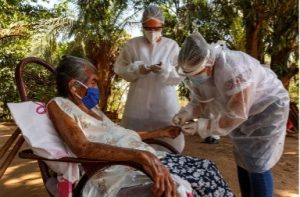 Dedication:
Dedication:
The Journal of Global Rights & Organizations and Impunity Watch News dedicates this article to Zaiden Geraige Neto, Ph.D., who passed away from COVID-19. Zaiden was pursuing his LL.M. at the College of Law and had joined the Impunity Watch News team in 2021. Zaiden was a highly regarded class action lawyer and law professor in Brazil. He also leaves his legacy in numerous articles and books about law theory and practice. We extend our deepest sympathy to Zaiden’s wife, family, friends, and loved ones.
Rest In Peace, Zaiden
BRASILIA, Brazil – As COVID-19 deaths continue to rise to their highest levels yet, and a dangerous new variant stalks Brazil, President Jair Bolsonaro tells Brazilians to “stop whining.” Currently, Brazil ranks third amongst all countries in confirmed COVID-19 cases. President Jair Bolsonaro’s “lack of a cohesive and rigorous” COVID-19 policy and other “geographic and governmental challenges” threaten all Brazilians, but particularly the vulnerable communities like the Indigenous populations.

According to Survival International, Brazil is made of nearly 305 Indigenous tribes which are composed of 900,000 people. Amongst these Indigenous communities, there have been 50,000 confirmed COVID-19 cases and 900 deaths. “Those who have died include people working in health care, traditional healing, politics and education, as well as chiefs and leaders of their own tribes.”
Health experts warn that Indigenous people are particularly vulnerable to COVID-19 due to “factors ranging from lack of consistent healthcare to their culture of shared housing and food.” Additionally, due to the isolated nature of their communities, Indigenous people have not developed the same immunity to pathogens like the rest of the Brazilian population. While Brazil’s health ministry claimed that Indigenous communities would be some of the first to be inoculated, many Indigenous leaders of territories not recognized by the Brazilian government have stated that their community members have not been vaccinated. According to the University of São Palo, it will take over four years for Brazil to immunize its entire population if Brazil’s current rate of vaccination is maintained. Today, only 3.8 percent of Brazilians have been vaccinated. Meanwhile, the U.S. is administering over 2 million vaccinations a day.

Four years is far too long. Historically, Indigenous communities have been disproportionately impacted by pandemics, such as the measles and now COVID-19. The Brazilian government must act now to protect its most vulnerable, including those who reside on land outside the Amazon that is not legally recognized. With this, Brazil should support the proposed World Trade Organization (“WTO”) Trade-Related Aspects of Intellectual Property Rights waiver (“TRIPS”).
In October 2020, India and South Africa proposed the waiver that would allow all countries “to collaborate on the COVID-19 response, including vaccine development and distribution, without being unduly hampered by the complexity of laws and restrictions governing intellectual property.” Since then, over one hundred countries globally have endorsed the proposal while President Jair Bolsonaro’s administration has remained in opposition.
During the HIV/AIDS epidemic, Brazil supported a similar proposal that allowed the global distribution of treatment. Once again, Brazil should take the lead in “prioritizing public health over intellectual property rules” and pharmaceutical companies’ profits. Inequitable access to vaccinations is a clear human rights issue.
For further information, please see:
Reuters – Slow rollout of COVID-19 vaccine in Brazil leaves indigenous at risk – 4 Mar. 2021
BBC News – Covid: Bolsonaro tells Brazilians to ‘stop whining’ as death spike – 5 Mar. 2021
Human Rights Watch – Brazil: Support Wider Vaccine Production at WTO – 9 Mar. 2021



